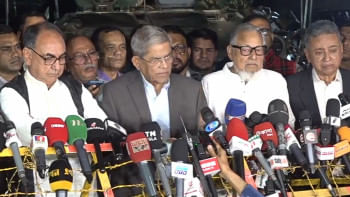All Rohingya refugees to be under biometric registration in 60 days

All the Rohingya refugees, who are now in Bangladesh after they fled persecution in the Rakhine state of Myanmar, will be biometrically registered in two months, Bangladesh's disaster management and relief minister said today.
So far, 5,575 refugees have been registered in 10 booths set up near different camp sites in Cox's Bazar, Mofazzal Hossain Chowdhury Maya said in a press conference held at the conference room of his ministry.
"Thirty registration booths will be operating from today to speed up the biometric registration process."
According to current estimates, 424,000 Rohingya refugees have entered the country between August 25 and September 20, Maya said.
Bangladesh is sheltering the Rohingya refugees on humanitarian grounds and Myanmar will have to take back their citizens, Maya said.
Relief and aid for Rohingya refugees
From local and international organisations, Bangladesh has so far received 250 metric tonnes of rice and 20 metric tonnes of wheat as relief for the Rohingya refugees, Maya observed.
Apart from this, almost all other countries have assured of assistance to the refugees, most of whom are women and children, he said.
Fourteen registered camps have been set up in different regions of the coastal district Cox's Bazar which is receiving the first flow of the refugees, he added.
Water and Sanitation
With the influx of refugees, it has become imperative to provide clean drinking water and access to sanitation and that's why the Department of Public Health and Engineering (DPHE) is setting up 500 toilets around the camp areas.
Moreover, the DPHE is also distributing 14,000 units of clean drinking water to the Rohingya refugees and installing 100 deep water tube wells for them, Maya said.
Rohingya people, often termed as the most persecuted minority in the world, have been fleeing the Rakhine state of Myanmar after military persecution which claims to be targeting Rohingya insurgents that attacked a military outpost on August 25.
The brutal mistreatment of the Rohingyas in the Rakhine state of Myanmar has been described by the UN as a "textbook example of ethnic cleansing".


 For all latest news, follow The Daily Star's Google News channel.
For all latest news, follow The Daily Star's Google News channel. 








Comments